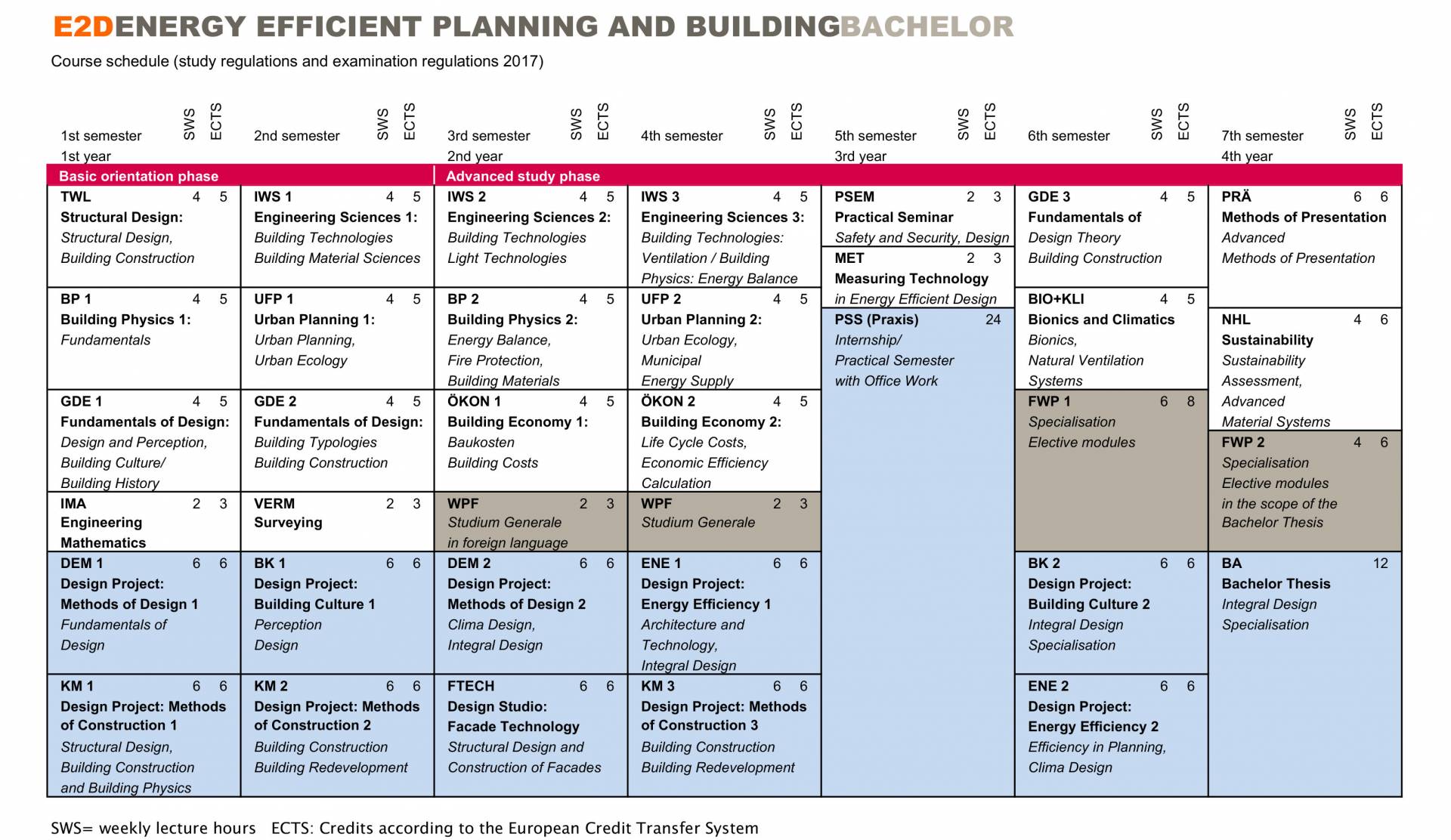
- Architecture and Civil Engineering
- International
- Incoming
- Energy-Efficient Planning and Building - E2D (Bachelor)
Energy-Efficient Planning and Building - E2D (Bachelor)

COMMITTED–CREATIVE– PRACTICAL
Addressing the complex topics of resource consumption and sustainability in the context of construction: this is the focus of the degree program “Energy-Efficient Planning and Building – E2D”
To do so, architectural and engineering elements are combined. The classical design processes for buildings and urban development contexts involve aspects of design, construction and profitability not to mention building typology and social interaction. They are now complemented by the factors of building physics, building services and environmental accounting. These additional factors are, by way of intensive study, understood to be an integral part of a cybernetic design process. Taken continuously into account, they can have an impact as early as the initial planning phase. Here crucial groundwork with respect to sustainability is laid.
Students receive practical and process-oriented instruction using a number of specific projects. A networking and system-oriented approach is also mirrored by the interdisciplinary nature of the teaching staff. The up-to-date processes and methods taught enable the students to use these interacting relationships expertly in planning processes and consultations. They can adapt quickly to changing requirements with regard to resource-efficient planning.
As such, this is a trendsetting degree program. Our graduates will have sought-after personalities.
COURSE SCHEDULE
The degree program is offered as a full-time course, the normal duration of which is seven semesters. It is structured in a modular fashion and is highly interdisciplinary with a strong focus on project work. Furthermore, it can act as a springboard to a subsequent, application-oriented academic qualification, such as the E2D master program “Energy Efficient Design”.
With the objective of integral planning in mind, the wide range of specialist subjects are taught in an interdisciplinary fashion with an ever increasing level of complexity. They are interwoven into two projects each semester in a practical manner from the first semester onwards.
Following the introductory and orientation phase in the first year of study, the advanced studies phase allows the students to broaden their skill set and to complete a part-time practical semester. Students can specialise in certain areas by way of required elective modules. The bachelor thesis concludes the degree course.
Integral planning as an approach – from classical architecture to air-conditioning, building physics, building technology and environmental accounting – is not simply a key area of focus, but a universal concept. Moreover, typical subject areas during the advanced studies phase are, for example, digital planning tools, daylight and artificial light, façade technology, material innovation, industrial production techniques/innovative timber construction, building redevelopment or sustainable district and city planning. What form will a design process take, that incorporates and quantifies the interaction of this plurality of requirements?
Courses recommended for international students (project studios with crits in English language).
Further courses held in German language can be attended.
| 2nd year COURSE NAME | HOURS/WEEK | ECTS* | OFFERED IN* |
|---|---|---|---|
| Methods of Design 2 | 6 | 6 | WS |
| Facade Technology | 6 | 6 | WS |
| Energy Efficient Design 1 | 6 | 6 | SS |
| Methods of Construction 3 | 6 | 6 | SS |
| 3rd year COURSE NAME | HOURS/WEEK | ECTS* | OFFERED IN* |
|---|---|---|---|
| Architectural Design and History (Baukultur) 2 | 6 | 6 | SS |
| 6 | 6 | SS |
| 4th year COURSE NAME | HOURS/WEEK | ECTS* | OFFERED IN* |
|---|---|---|---|
| Bachelor Thesis | x | 12 | WS |
| COURSE NAME | HOURS/WEEK | ECTS* | OFFERED IN* |
|---|---|---|---|
| Additional Classes | |||
| Specialization Classes in Energy Efficient Planning and Building WPF / SRE* | (vary each year) | 2 | WS / SS |
| General Classes | |||
| German Language AWP / GRE* | (vary each year) | 2 | WS / SS |
| International Communication AWP / GRE* | (vary each year) | 2 | WS / SS |
*ects_european transfer credit system
*WS_Winter Semester
*SS_Summer Semester
*WPF/SRE_specialized required electives
*AWP/GRE_general required electives

